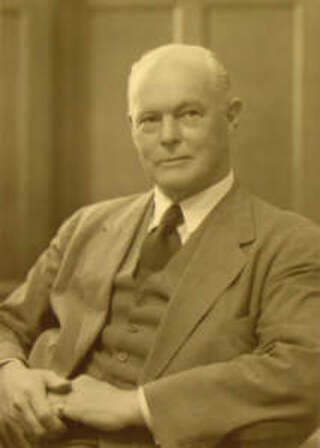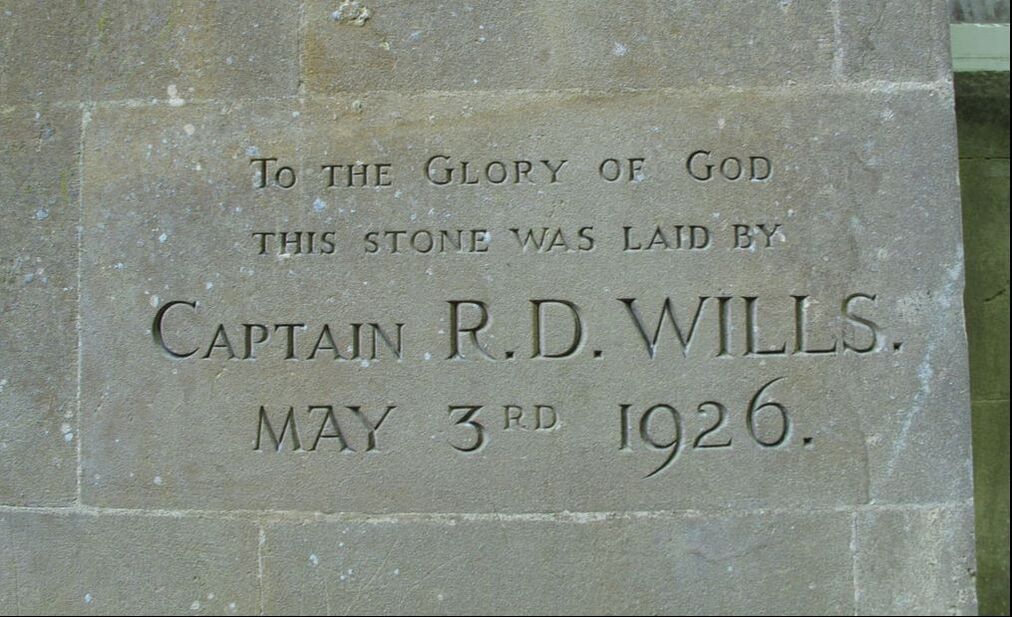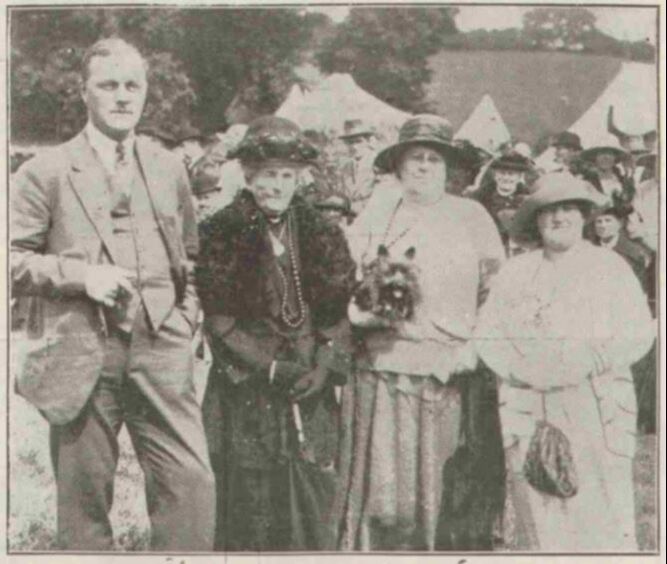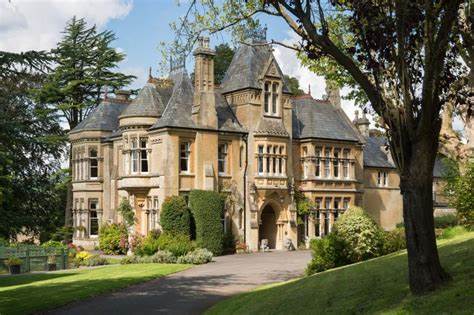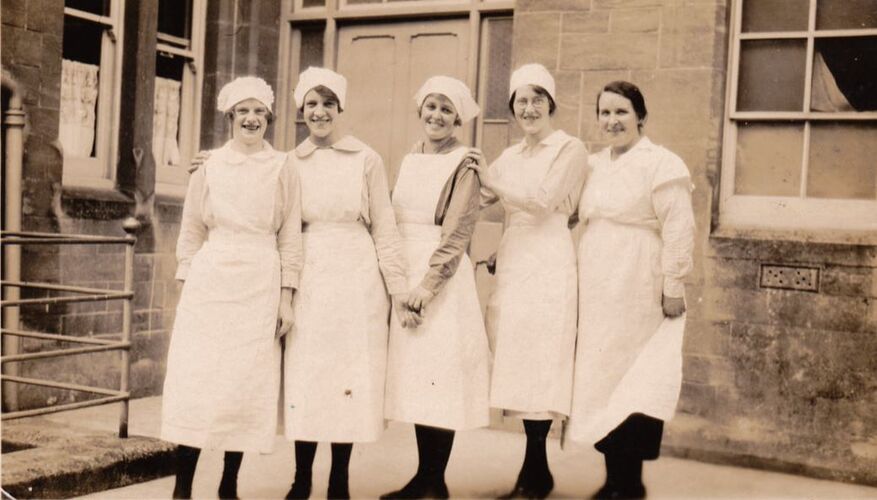|
The Wills Family at Fogleigh and Kingsdown Alan Payne January 2021 The company WD & HO Wills is traditionally associated with cigarettes which were manufactured in Bristol in the nineteenth and twentieth century. They started under this name in 1830 and built factories throughout Bristol: Redcliffe Street, East Street Bedminster (now the Tobacco Factory Theatre), and Raleigh Road Southville in the late Victorian period. Many Box residents would have smoked their brands, such as Woodbine, Embassy, Capstan and Wills’ Fine Shag, whilst children collected the cigarette cards of sportsmen, butterflies, the Empire and railway engines distributed free in the packs. Right: Frank Oliver Wills courtesy cliftonrfchistory.co.uk/cliftonfam/wills/wills.htm |
Wills Family
The family were non-conformist in religious belief and financed the building of over thirty Congregational churches in Bristol. They were great benefactors in Bristol, where they endowed Bristol University, centred on the Wills Memorial Tower on Park Street, the Bristol Museum and Art Gallery and the Victoria Rooms, Clifton. As manufacturers they were very benevolent employers albeit in a rather paternalistic way. Employing mostly unmarried women in their factories, offering a secure job, departmental canteens, free medical care, resident nursing care and paid holidays.
In 1901 Sir William Henry Wills, the 1st Baron Winterstoke, led the company in a merger with John Player and Sons of Nottingham and eleven other companies. The amalgamated group was called The Imperial Tobacco Company and it expanded into countries across the world. By 1933 it employed 40,000 people in 27 factories internationally. They were everywhere and even family members were most extensive - the son of HO Wills, also named HO, had 22 children by two wives.
Captain Ronald Dewhurst Wills
Captain RD Wills was the son of A Stanley Wills and the first member of the family to have an interest in Box. He was a great philanthropist who lived at Corston, west of Bath.[1] A career soldier, he served in the 4th Battalion of the Somerset Light Infantry in India and Mesopotamia (modern Iraq, Syria and Turkey).
The family were non-conformist in religious belief and financed the building of over thirty Congregational churches in Bristol. They were great benefactors in Bristol, where they endowed Bristol University, centred on the Wills Memorial Tower on Park Street, the Bristol Museum and Art Gallery and the Victoria Rooms, Clifton. As manufacturers they were very benevolent employers albeit in a rather paternalistic way. Employing mostly unmarried women in their factories, offering a secure job, departmental canteens, free medical care, resident nursing care and paid holidays.
In 1901 Sir William Henry Wills, the 1st Baron Winterstoke, led the company in a merger with John Player and Sons of Nottingham and eleven other companies. The amalgamated group was called The Imperial Tobacco Company and it expanded into countries across the world. By 1933 it employed 40,000 people in 27 factories internationally. They were everywhere and even family members were most extensive - the son of HO Wills, also named HO, had 22 children by two wives.
Captain Ronald Dewhurst Wills
Captain RD Wills was the son of A Stanley Wills and the first member of the family to have an interest in Box. He was a great philanthropist who lived at Corston, west of Bath.[1] A career soldier, he served in the 4th Battalion of the Somerset Light Infantry in India and Mesopotamia (modern Iraq, Syria and Turkey).
|
He contracted malaria and although he wanted to stand as the Conservative candidate for the Frome Constituency, ill-health forced him to stand down in 1924.[2] RD was a keen Scout, awarded the Medal of Merit of the movement and he rose to the rank of assistant county commissioner.[3]
His generosity seemed boundless. In 1924 he agreed to match the proceeds from a Salvation Army Sale of Works out of his own pocket.[4] The Sale raised £70, which he doubled. For seven years he was treasurer of the Western Division of the YMCA and president of the Bath branch, which he also supported financially.[5] |
The connection with Box was in the building of an impressive Methodist chapel and schoolroom at Kingsdown to serve the needs of local quarrymen and their families. From about 1870, a little Methodist chapel had existed there, until it was possibly destroyed in a landslip. Local ministers and residents started to fundraise for a new chapel to be built fronting the Lower Kingsdown Road and the old building behind converted into a school, both installed with electricity.[6] The total cost was £704 (contemporary value £40,000) and local people wrote to a kind friend, Captain Wills, asking for a gift of £250 to start the work. The diocese and local people raised £270, leaving a balance of £180 which Captain Wills later settled. Prominent activists included the Methodist ministers Sister Lillian and Rev WHS Snow, John Brooke, GK Turvey and Simeon Butt.
Captain Wills’ gift was exceptional, especially since he was not himself a Methodist but rather belonged to the Church of England.[7] His address on the opening identified the building as Our Chapel and he opened it saying I declare this Church opened for public worship in the name of the Father, the Son and the Holy Ghost. The congregation broke out in singing the Doxology: Praise God, from Whom all blessings flow. Praise Him, all creatures here below. Praise Him above, ye Heavenly Host. Praise Father, Son, and Holy Ghost. It was recognised as a truly Christian gift from Captain Wills. He died in 1937, when he was 46, unmarried but with an adopted son. He had shared an inheritance of three and a quarter million pounds from his father and gave most of it away by the time of his death, mostly to fund YMCA boys centres at Bath and Combe Down and to the Bath and West Orthopaedic Hospital.[8] He died intestate and his estate was administered by his only brother, Wilfred, who lived at Skipton, Yorkshire.
Fogleigh House, Box
At this stage we need to break off from the Wills family narrative to consider a local property, Fogleigh House, Box Hill. The house is one of the most imposing residences in the village. It was built by the quarry-owner Cornelius Pictor in 1881 and is a magnificent example of Gothic architecture.
Captain Wills’ gift was exceptional, especially since he was not himself a Methodist but rather belonged to the Church of England.[7] His address on the opening identified the building as Our Chapel and he opened it saying I declare this Church opened for public worship in the name of the Father, the Son and the Holy Ghost. The congregation broke out in singing the Doxology: Praise God, from Whom all blessings flow. Praise Him, all creatures here below. Praise Him above, ye Heavenly Host. Praise Father, Son, and Holy Ghost. It was recognised as a truly Christian gift from Captain Wills. He died in 1937, when he was 46, unmarried but with an adopted son. He had shared an inheritance of three and a quarter million pounds from his father and gave most of it away by the time of his death, mostly to fund YMCA boys centres at Bath and Combe Down and to the Bath and West Orthopaedic Hospital.[8] He died intestate and his estate was administered by his only brother, Wilfred, who lived at Skipton, Yorkshire.
Fogleigh House, Box
At this stage we need to break off from the Wills family narrative to consider a local property, Fogleigh House, Box Hill. The house is one of the most imposing residences in the village. It was built by the quarry-owner Cornelius Pictor in 1881 and is a magnificent example of Gothic architecture.
|
The relationship of the Pictor family with Fogleigh House was a curious one. Cornelius hadn’t expected to be chairman of the Stone Firms. Robert, his elder brother and developer of Pictor & Sons, had died suddenly aged 46 in 1877 at about the same time that Cornelius was commissioning architects James Hicks of Redruth to undertake work at Fogleigh.
In 1898 Cornelius resigned from the business writing an extraordinary letter to local newspapers saying that at all times I have been honest in my endeavours to carry out the duties imposed on me by the shareholders.[9] He had differences with other directors and the shareholders over the future of the company, amongst other matters the acquisition of the Portland stone business. |
Cornelius was also unwell and probably unsuited to running the company, certainly not wanting to be chairman at times when the group’s profits and its dividend was declining. Unmarried and living with his sisters, he had no-one to counsel and guide him. He may have had concerns about an earthquake in 1896 most severely felt in the neighbourhood of Box.[10] There was no damage to his property and the shock was experienced in a large local area including Bath, Monkton Farleigh, Castle Combe, Calne and Devizes. At the same time, Poole, Hereford. Liverpool, and Leicester also reported disturbances. In the end, Cornelius lived until 1916, devoting much of his time to the house.
Frank Oliver Wills
Back with the Wills family story, Frank Oliver Wills (3 April 1882 - 31 July 1972) was the great-great grandson of HO Wills. He was the second of five sons of Sir Frank William Wills, architect and surveyor, and Lord Mayor of Bristol, and worked his way up in the family tobacco business, starting as a clerk and rising to become a director of Imperial and manager in Bristol.
In 1906 Frank married Edith Mary Powell at Bath, the eldest daughter of Bath councillor GF Powell of Green Park. Before the Second World War Frank and his wife lived at the Manor House, Abbot’s Leigh, Bristol. Frank Oliver was a highly respected person, appointed Sheriff of Bristol in 1924, Master of the Bristol Merchant Venturers in 1942.
Frank Oliver Wills
Back with the Wills family story, Frank Oliver Wills (3 April 1882 - 31 July 1972) was the great-great grandson of HO Wills. He was the second of five sons of Sir Frank William Wills, architect and surveyor, and Lord Mayor of Bristol, and worked his way up in the family tobacco business, starting as a clerk and rising to become a director of Imperial and manager in Bristol.
In 1906 Frank married Edith Mary Powell at Bath, the eldest daughter of Bath councillor GF Powell of Green Park. Before the Second World War Frank and his wife lived at the Manor House, Abbot’s Leigh, Bristol. Frank Oliver was a highly respected person, appointed Sheriff of Bristol in 1924, Master of the Bristol Merchant Venturers in 1942.
Frank and Edith Wills in Box
Frank and Edith retired to Fogleigh House in October 1947. Their grandson, James Wills, spoke of visiting them at Fogleigh: Of particularly staunch Victorian principles, my grandfather was indeed a formidable character as he sat in his armchair, adorning a smart pressed suit, stiff white collar and motif tie. I particularly remember the ever-present halo of tobacco smoke encircling his head.[11] We might imagine that they wanted a fresh challenge in retirement and large properties were extremely cheap after the Second World War. So, they snapped up a rural country estate in Box, probably attracted by the same non-conformist religious values as the house’s founder, Cornelius Pictor.
Frank joined in local affairs and served on the Housing Committee of the Calne & District Council in the early 1950s, representing Box.[12] Their presence in the village didn’t go unnoticed with alarming consequences in October 1951 when £1,000 of jewellery was stolen from the house in a daring raid, notwithstanding that Frank and Edith were at home at the time together with two servants.[13] The thieves used a ladder taken from an outhouse 200 yards away, placed the ladder on a garden seat to gain access into the upper bedrooms. The theft comprised rings, broaches, a watch and a necklace and was worth £32,000 in today’s values.[14] The family put the problem down to their deafness. Mrs Wills said: The cook is deaf and the nannie is 70. Mr Wills is rather deaf and even the dog we keep in the house is rather deaf.[15] They could scarcely manage in such a big house and in 1953 they advertised for help: a cook-general or a cook and handyman.[16]
Fogleigh House was put up for sale in 1954, advertised as A Country House set in picturesque grounds of about 6 acres.[17] It had 4 reception rooms, 7 principal and 6 secondary bedrooms, entrance lodge and outbuildings. The grounds also comprised smallholding of 4½ acres with cottage, and a farmery attested and TT (free from disease and cattle fertility problems by being Trich tested). The area of the farm was extensive comprising 18½ acres with a quarter of a mile of trout fishing. Frank and Edith left the village in 1955, moving back to Bristol where Frank died at Westbury-on-Trym in 1972. His eldest son Alan Oliver (10 August 1909 – 5 October 1996), a naval officer, married Rosamond Batty, one-time welfare superintendent at one of the tobacco factories.[18]
The house and part of the grounds were bought by Mr and Mrs Victor Toogood who regularly agreed to host the church fete in their grounds. The fete in August 1959 was a fabulous event more like a carnival, one of the happiest in memory.[19] The event in 1961 was to raise £500 towards new boilers for the church.[20] A colour film was made of the event but unfortunately it only raised £7 profit.[21] They left Box in the mid-1960s but Mrs Toogood came back to open the church fete at Box House in 1965.[22]
Shockerwick House
Strangely, the Imperial Group returned to the local area in 1970 when they bought the magnificent Shockerwick House, built by John Wood the Elder. The Grade I listed Georgian property has a fascinating history, owned by the Morley family from 1895 until 1955, then from 1961 by the Duke of Newcastle, who sold it to the tobacco company. The Imperial Group used it as a management training centre until 1982, when it was bought by a Bath consortium and called Gainsborough Homes.[23] It was converted into a nursing home and in 1998 became Shockerwick Nursing Home, operated by BUPA.
Frank and Edith retired to Fogleigh House in October 1947. Their grandson, James Wills, spoke of visiting them at Fogleigh: Of particularly staunch Victorian principles, my grandfather was indeed a formidable character as he sat in his armchair, adorning a smart pressed suit, stiff white collar and motif tie. I particularly remember the ever-present halo of tobacco smoke encircling his head.[11] We might imagine that they wanted a fresh challenge in retirement and large properties were extremely cheap after the Second World War. So, they snapped up a rural country estate in Box, probably attracted by the same non-conformist religious values as the house’s founder, Cornelius Pictor.
Frank joined in local affairs and served on the Housing Committee of the Calne & District Council in the early 1950s, representing Box.[12] Their presence in the village didn’t go unnoticed with alarming consequences in October 1951 when £1,000 of jewellery was stolen from the house in a daring raid, notwithstanding that Frank and Edith were at home at the time together with two servants.[13] The thieves used a ladder taken from an outhouse 200 yards away, placed the ladder on a garden seat to gain access into the upper bedrooms. The theft comprised rings, broaches, a watch and a necklace and was worth £32,000 in today’s values.[14] The family put the problem down to their deafness. Mrs Wills said: The cook is deaf and the nannie is 70. Mr Wills is rather deaf and even the dog we keep in the house is rather deaf.[15] They could scarcely manage in such a big house and in 1953 they advertised for help: a cook-general or a cook and handyman.[16]
Fogleigh House was put up for sale in 1954, advertised as A Country House set in picturesque grounds of about 6 acres.[17] It had 4 reception rooms, 7 principal and 6 secondary bedrooms, entrance lodge and outbuildings. The grounds also comprised smallholding of 4½ acres with cottage, and a farmery attested and TT (free from disease and cattle fertility problems by being Trich tested). The area of the farm was extensive comprising 18½ acres with a quarter of a mile of trout fishing. Frank and Edith left the village in 1955, moving back to Bristol where Frank died at Westbury-on-Trym in 1972. His eldest son Alan Oliver (10 August 1909 – 5 October 1996), a naval officer, married Rosamond Batty, one-time welfare superintendent at one of the tobacco factories.[18]
The house and part of the grounds were bought by Mr and Mrs Victor Toogood who regularly agreed to host the church fete in their grounds. The fete in August 1959 was a fabulous event more like a carnival, one of the happiest in memory.[19] The event in 1961 was to raise £500 towards new boilers for the church.[20] A colour film was made of the event but unfortunately it only raised £7 profit.[21] They left Box in the mid-1960s but Mrs Toogood came back to open the church fete at Box House in 1965.[22]
Shockerwick House
Strangely, the Imperial Group returned to the local area in 1970 when they bought the magnificent Shockerwick House, built by John Wood the Elder. The Grade I listed Georgian property has a fascinating history, owned by the Morley family from 1895 until 1955, then from 1961 by the Duke of Newcastle, who sold it to the tobacco company. The Imperial Group used it as a management training centre until 1982, when it was bought by a Bath consortium and called Gainsborough Homes.[23] It was converted into a nursing home and in 1998 became Shockerwick Nursing Home, operated by BUPA.
References
[1] The Wells Journal, 24 September 1937
[2] The Shepton Mallet Journal, 19 September 1924
[3] Bath Chronicle and Herald, 10 December 1932
[4] The Bath Chronicle, 17 May 1924
[5] Western Daily Press, 10 February 1931
[6] Bath Chronicle and Herald, 3 July 1926
[7] Bath Chronicle and Herald, 3 July 1926
[8] The Yorkshire Post, 4 November 1937
[9] The Bath Chronicle, 24 March 1898
[10] The Wiltshire Times, 19 December 1896
[11] James Wills, A Backward Glance through the Visitors’ Book
[12] Wiltshire Times and Trowbridge Advertiser, 19 April 1952
[13] Wiltshire Times and Trowbridge Advertiser, 20 October 1951
[14] Coventry Evening Telegraph, 15 October 1951
[15] Coventry Evening Telegraph, 15 October 1951
[16] Wiltshire Times and Trowbridge Advertiser, 25 July 1953
[17] The Wiltshire Times, 6 November 1954
[18] Yorkshire Post and Leeds Intelligencer, 29 June 1942
[19] Parish Magazine, September 1959
[20] Parish Magazine, June 1961
[21] Parish Magazine, November 1961
[22] Parish Magazine, July 1965
[23] Bathford History Society, http://www.bathfordsociety.org.uk/content/pdfs/brief_history_of_shockerwick_house_full.pdf
[1] The Wells Journal, 24 September 1937
[2] The Shepton Mallet Journal, 19 September 1924
[3] Bath Chronicle and Herald, 10 December 1932
[4] The Bath Chronicle, 17 May 1924
[5] Western Daily Press, 10 February 1931
[6] Bath Chronicle and Herald, 3 July 1926
[7] Bath Chronicle and Herald, 3 July 1926
[8] The Yorkshire Post, 4 November 1937
[9] The Bath Chronicle, 24 March 1898
[10] The Wiltshire Times, 19 December 1896
[11] James Wills, A Backward Glance through the Visitors’ Book
[12] Wiltshire Times and Trowbridge Advertiser, 19 April 1952
[13] Wiltshire Times and Trowbridge Advertiser, 20 October 1951
[14] Coventry Evening Telegraph, 15 October 1951
[15] Coventry Evening Telegraph, 15 October 1951
[16] Wiltshire Times and Trowbridge Advertiser, 25 July 1953
[17] The Wiltshire Times, 6 November 1954
[18] Yorkshire Post and Leeds Intelligencer, 29 June 1942
[19] Parish Magazine, September 1959
[20] Parish Magazine, June 1961
[21] Parish Magazine, November 1961
[22] Parish Magazine, July 1965
[23] Bathford History Society, http://www.bathfordsociety.org.uk/content/pdfs/brief_history_of_shockerwick_house_full.pdf
